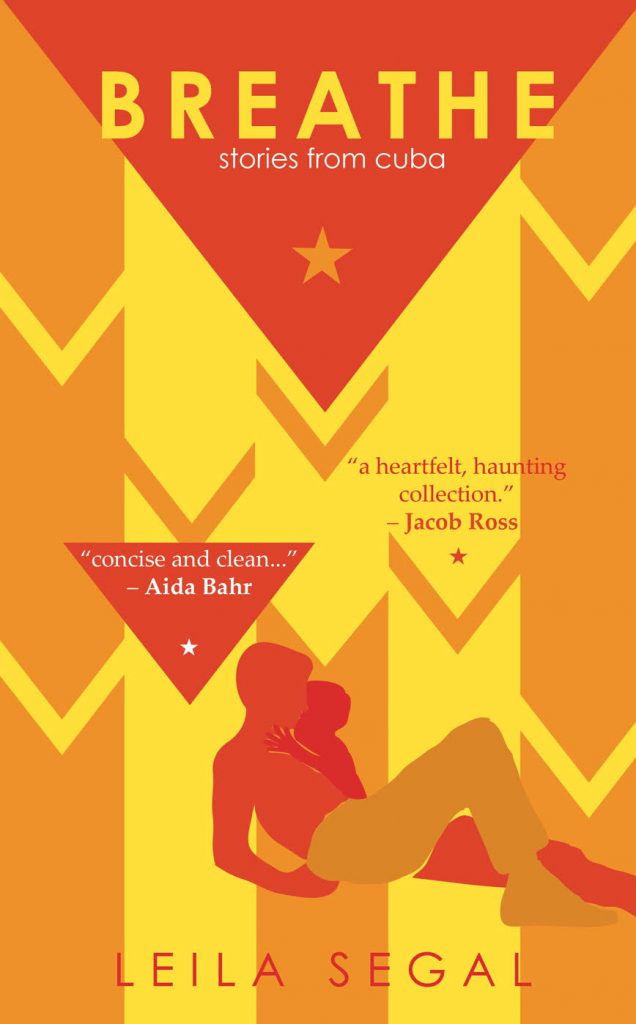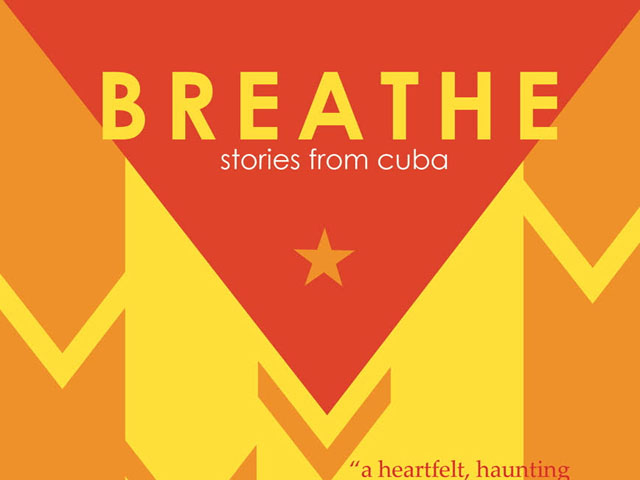Leila Segal’s debut collection of short stories, Breathe: Stories from Cuba is out now from Flipped Eye Publishing. Leila talks to Melanie Jones about Cuba, her writing, and its connection to her advocacy work. Leila also shares her short story Luca’s Trip to Havana. You can buy a copy of Breathe here. Leila will be reading at MIRLive on January 30th and copies of Breathe will be on sale at this event.
 MJ: What was it about Cuba that inspired this collection? Can you tell us about your personal experience and about Cuba’s history in general?
MJ: What was it about Cuba that inspired this collection? Can you tell us about your personal experience and about Cuba’s history in general?
LS: I first went to Cuba in 2000. I had a strong feeling when I got there that it was the place for me to write. I rented a flat in Havana and devoted myself to writing. There was something about the strangeness. Cuba is not a straightforward environment; it’s an attractive place, but I sensed the difficulty and the complexity that lay beneath the surface. Being there stimulated work—I think, as writers, we are usually trying to make sense out of things or to write our own version of events in a situation where there are ambiguities and difficulties. Looking back, that’s how I understand my motivation, although at the time I wasn’t able to articulate it that way.
MJ: You talk about making sense of things and having your own version of events. I wanted to ask you about the border between and fiction and non-fiction in the collection and how you feel about ideas of ‘truth’. How true are these stories?
LS: None of them is true: they’re all made up, though much of the detail is taken from observation—I kept notebooks while I was in Cuba. But all the stories have a fundamental emotional truth, my emotional truth. What prompts me to write is the feeling that I’m living in a world where truth is hard to identify; through my writing I search for it, make my best picture on the evidence I find, lay out parallel versions side by side.
I’m interested in surfaces and what lies beneath them, fascinated by falsity and dissembling. I try to allow readers to see surface and what lies beneath at the same time, so they have the same experience of dissonance as I do in life. People often don’t understand what creative writers do—our work lies at the opposite end of the spectrum to fact-based writing—journalism, for example. A journalist aims to present an accurate representation of fact whereas creative writing is really the opposite: I distort everything that comes into me in the service of my own vision.
MJ: When you’re not writing, you work on advocacy projects like Voice of Freedom. How do you think this difference between the actual truth and a wider emotional truth through fiction plays a part in advocacy relationships? Is writing a kind of advocacy when you are giving a voice to those with a very different background to you?
LS: Although my characters are apparently very different from me, they exist only within the confines of my own consciousness. I did create them, and obviously I create characters through my experience of life, and my observation of others. But there is also imagination. Imagination distorts everything. We experience through our limitations, our backgrounds, and psyche.
I am inhabited by the characters as I write; I become them. There is certainly a connection between that experience and advocacy. Working with a woman on Voice of Freedom, for example, I will clear a space between us, where I am not, so that she can inhabit it—more fully become herself, make her voice heard. Where there was no space for her, and no one was listening, there is now a space and I am listening. The work she creates there will go on to reach a wider audience.
I see it as a continuum—the creativity of the woman is equal to mine, her creative process similar to mine. She knows rich, deep and difficult experience: whilst I facilitate the work, its germination lies within her.
One of the things that used to distress me when I was younger was that I felt empty, that I wasn’t a person; I didn’t have strong sense of self. But now I see that as an ideal quality for an artist—because of this sense I have of being inhabited by others. In good writing, the author will step back and create an experience for the reader, who is partner in the creation. If the authorial voice is too strong, it crowds out the reader. There must be space in the work for the reader.
MJ: In Voice of Freedom, women are using photography to illustrate their experience. I am photographer (or I used to be) and I’m always interested in the parallels between what can be expressed in an image and what we can express in creative writing. Do you have any thoughts about these parallels?
LS: Writing is visceral, sensual and emotional. I receive much of my emotional information through my eyes. For me, taking a photograph is another way of observing the world deeply and of concentrating on certain details, angles and perspectives. So I would say that photography is not purely visual, just as writing is not purely linguistic.
I often have a sense of the words arriving with my feeling—with my human and emotional response. They arrive as if on a conveyor belt, delivered to me. But feeling is not really a good enough word—it’s more, even, than that: my human responses or my . . . I don’t know what they are, certainly not my intellect. I try to switch off that part of my mind when I’m writing. I don’t want to be analysing and thinking about the thing I’m writing about; I want to experience it. So for me, the question is, how do I best experience to arrive at a place where the vision is delivered through my hand (I always write by hand)?
Observation is a part of that, awareness is a part of that, and mental stillness, which comes back to the idea of space. I don’t want to be too crowded by thought and analysis; I want to experience directly as much as possible—another reason why I liked writing in Cuba: my lack of understanding there. I was totally out of my depth linguistically, culturally, physically—it was a difficult environment to live in. It stripped me down, so I was experiencing directly, as a child might, without filters, patterns or preconceptions—and for me, that produces very fresh writing.
MJ: You talk about creating through your experience of the world and your experience of the senses. It feels like a very internal personal process. I wonder how, now that the collection is published, you’ve felt having readers react to the work. Have the readers reacted as you expected them to? Have they ‘filled the space’ in the way that you thought, both in the UK and in Cuba.
LS: The reaction to the book has been delightful, and made me happier than I ever thought I would be. People have responded passionately. Publication has connected me deeply to my audience—I see the reaction in people’s eyes when I give readings, and afterwards they talk to me about their own lives and experiences.
I haven’t had any negative responses, which surprised me—I thought some parts of the book might be controversial. The stories, though set in Cuba, are human at heart. They are about relationships, and the difficulties that we encounter in our lives, which could happen in any culture and country. I think this is why people have connected to my characters and their problems and difficulties.
Readers talk to me about the characters as if they really exist; they get angry with some of them and feel sorry for others, or identify with them. They ask me why characters did things, or what happened to them after the story finished, as if they’re real—and I love that because it means that the work has succeeded. I want to be a storyteller. I want to move people and connect to them, offer them something through my work and my living.
I was compelled to write but it’s hard to follow through and finish, especially having a book published, which is such a long process. There were many times when I felt it might not happen. So the reward, when it comes, is very intense. Perhaps all people who create things, and all performers, need that: the connection to other human beings is the reward.
The response from Cuba has been positive too. Aida Bahr, one of Cuba’s finest short story writers, gave me a beautiful blurb for Breathe. She endorsed it as a Cuban. One of the main things that concerned me when I wrote it was that I might be a sort of fantasist, a foreigner writing all of these things and totally out of touch. But the point of view in almost all of the stories is one of a foreigner, and there’s no pretence in that, we’re looking in through the eyes of a non-Cuban. I think that’s probably why Cuban readers have responded positively too.
I have been promoting Breathe with a wonderful classical guitarist, Ahmed Dickinson, a Cuban living in London—I read from Breathe, and he responds in music. Ahmed’s been here for 10 years. The day after we met, he read Breathe and asked for three more copies—one each for his wife, ex-girlfriend, and best friend. Ahmed felt that Breathe represented his bi-cultural experience: Cuban and the UK, and he needed it to show them what he had gone through—both in Cuba, and as a Cuban in the outside world. He said that Breathe felt utterly authentic, and spoke to the truth of the cross-cultural relationships that are so much a part of Cuban life now.
MJ: That’s amazing that he felt the book was something he could use as his own voice, that speaks for him. As a reader, it’s wonderful when you find a book like that that puts things into words and expresses a version of yourself that you feel is authentic enough to define a part of you.
LS: Yes, I couldn’t really have a greater endorsement than ‘I want a copy of your book so that my wife can understand me’!
MJ: Breathe was published by flipped eye, can you tell us about your experience of working with a small publisher?
I am very lucky to have worked with flipped eye, and with my editor there, Nii Parkes. It’s so good for a writer to have the kind of involvement and nurturing that I got there. Over a period of years, we worked on the collection and I was guided and mentored by Nii.
Nii’s first priority was always the integrity of the work; he’s a poet and novelist himself, and understands the writing process—that it can’t be done to a timetable if it’s going to be true and the best it can be. I was never rushed, always given freedom and the time to develop my work. I loved working with a small publisher. Writers may think it’s better to get a huge book deal somewhere, but I’m not sure you would be better off with a big publisher; you might get more attention from a small publisher who feels passionately about your work.
MJ: A lot of MIROnline readers are at the beginning of their writing careers. Do you have any further advice for writers who are just starting out?
The most important thing, I think, is to hear your own voice and to create conditions for yourself where you can be true to it. People might think, well how do I do that? But that is the journey. I’ve written for years and I write every day as a practice; I can tell now when the writing doesn’t ring true: I just don’t feel attached or connected to the work—it sounds like somebody else, like a newspaper or a voice on the radio.
So much of writing is the ear. That’s how the characters inhabit me, it’s often through the ear, through hearing their voices. The problem is, that if we listen too much, if we imitate too much then we lose everything that’s fresh and authentic about our own voice. Our own voice can be much less literary, much less well constructed—don’t’ be afraid to use that part of you. Imagine you’re talking to somebody—how do you talk? If you were chatting with your best friend on WhatsApp, how would you speak? And write like that, just as a way of loosening up and getting away from ideas about ‘good writing.’
We read books, we have expectations, we imitate and then we’re afraid. We’re all afraid of being wrong and making mistakes or not being good enough and I think my advice would be: write from the place where you aren’t good enough and you make a lot of mistakes. Make the mistakes, do it badly because it won’t really be bad, what will happen is you’ll pull away all the learned stuff and get back to something naked and raw which is absolutely you. That’s what’s compelling, what people want. There are enough boring and generic books around. People are really turned on by something original and very fresh.
When I work with the women on Voice of Freedom, I talk to them about their photographs, which often generates storytelling. They talk, I record, and we transcribe. Conversations are intimate, they take place in a trusting environment; the way the women speak is authentic and alive, and when you read it back it’s compelling. The same thing applies to us as writers. We need to find that place of authenticity, trust, and intimacy.
MJ: Thank you so much for talking with me and for your insights. It’s certainly given me a lot to think about in my own writing and I’m sure that the MIROnline readers will feel the same. Thank you as well for sharing your story Luca’s Trip to Havana. Before we finish up, can you give us a brief introduction to this story?
LS: I was interested in the relationships that I saw around me in Havana between foreigners and Cubans, and the strange dynamic that I witnessed in apparently romantic relationships where there were hidden driving forces. I wanted to uncover some of those forces and lay them bare by getting into the mind of a man who was having one of those relationships—a foreign man in a relationship with a Cuban.
Foreigners come to Cuba with economic power. They have money, which gives them the ability to attract Cubans who need that money and who would like to live abroad. It was interesting to look at the emotional dynamics of romance in this context, and how they’re distorted by economic and political factors. I wanted to know what it was like to be in the mind of a man like that. The story is told very closely from his point of view. Having said that, the woman in the story is not just a cardboard cut-out; motivation is complex and ambiguous on her part too. Nobody’s good and nobody’s bad—that’s the point of the story.

Melanie Jones is a PhD student at Birkbeck College. She was shortlisted for the 2014 Poetic Republic Short Story Competition and her submission “Silence” is published in their anthology Kissing Him Goodbye and Other Stories. Her work can also be found in The Mechanics’ Institute Review, Issue 11. Melanie is the Managing Editor of MIROnline.
